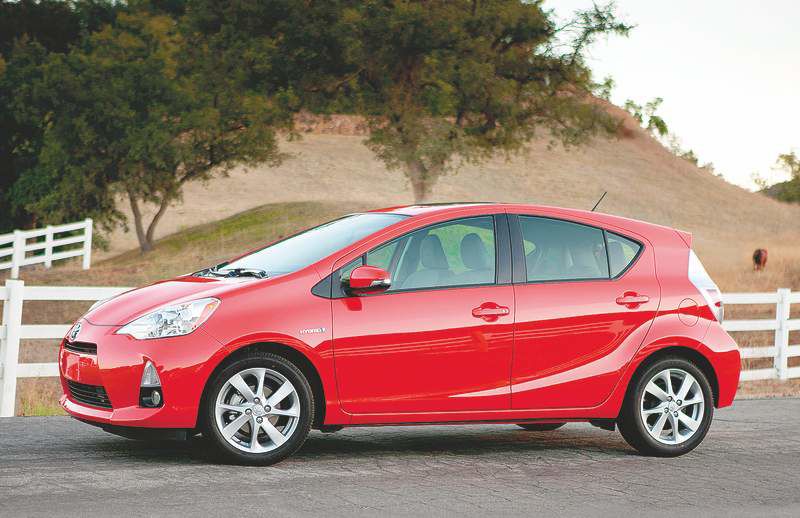Prius C skimps on comfort as well as space
Published 5:00 am Sunday, October 28, 2012

- The 2012 Toyota Prius C is a more compact version of Toyota's original Prius hybrid.
Toyota has a Goldilocks problem. As it tries to expand the Prius from a single car to a multi-model mini-brand, the automaker faces the reality that the first Prius — let’s call it the Prius Classic — was just right.
Papa Bear and Baby Bear, the new larger and smaller Prius V and Prius C, respectively, are each a bit too hot or cold, hard or soft. They’re doomed to be measured against the Prius Classic, and to suffer in that comparison.
The subcompact 2012 Toyota Prius C offers less space and comfort than the original model for a small improvement in fuel economy and cost.
Prius C prices start at $18,950. All Prius C’s come with a 1.5-liter, four-cylinder engine, electric motor and nickel-metal hydride battery that produce a total of 99 horsepower. A continuously variable transmission is standard equipment.
In a moment of unbridled creativity, Toyota named the trim levels One, Two, Three and Four.
Prices for the top Prius C Four start at $23,230. I tested one with an optional power sunroof and 16-inch alloy wheels. It cost $24,380. All prices exclude destination charges.
The Prius C’s low base price is its calling card. It competes with more expensive, larger hybrids like the Ford C-Max, Honda Civic and Insight and the upcoming VW Jetta. Mostly, though, I suspect it will compete with the just-right Prius Classic, which is bigger, better and only slightly more expensive. Prices for the original Prius start at $24,000.
The EPA rated the C at an eye-catching 53 mpg in the city, 46 highway and 50 in combined driving.
Those figures are impressive, but the key 50-mpg combined rating is only 3 mpg better than the roomy Ford C-Max. It’s the same as the Prius. (Papa Bear, the Prius V, checks in at 42 mpg combined.)
According to the EPA’s calculations, a Prius C owner will save only $50 a year on fuel compared with a larger C-Max. The C owner will pay exactly the same for fuel as a Prius Classic driver, but be in a smaller, noisier vehicle.
The C’s interior materials feel basic. Most of the surfaces are hard, without much padding or sound insulation. Road and wind noise are quite noticeable.
The audio quality of hands-free phone calls is very good. Toyota’s new voice-recognition system for phone calls, navigation, etc., is excellent.
Front-seat head, leg and shoulder room are good. The front seat needs more storage compartments for phones, iPods, etc. Rear legroom is not bad for a small car. The hatchback layout provides more luggage room than the competing hybrid small sedans.
In addition to the usual safety equipment, the C adds two new air bags. Hidden in the bottom cushion of the driver and front passenger seat, if activated, they raise the occupants to make sure they don’t “submarine” or slide under their seat belts and into the dash.
The C’s power and acceleration are unimpressive. Toyota says the C stands for city, and nothing about the car’s performance on the highway contradicts that. It reaches 60 mph in 11.5 seconds, a full 1.7 seconds slower than the enjoyable Prius. The auto-stop function that shuts the engine off when idling is smooth and quick, however.
I was able to drive on battery alone for short distances at low speeds, as long as I kept a very light foot on the accelerator pedal.
Steering effort is high, but without much feedback or feel. The ride is bumpy over rough surfaces. Handling is adequate, but not exciting.
The Prius C’s styling mimics the larger Prius, part of Toyota’s plan to transform the nameplate into an all-hybrid sub-brand. The front view shares the low, sloping hood and small grille of the Prius and V. At the rear, the vertical taillights, rear glass and hatch continue the family theme.
Other automakers have tried and failed to match the Prius for years. Now Toyota itself has discovered what a tough act the pioneering hybrid is to follow. The C’s price and fuel economy would make it an admirable little vehicle if it weren’t overshadowed by the Prius.
When it comes to the Prius family, shoppers might want to take a lesson from Goldilocks: Keep looking until you find the one that’s just right.
Reasons to buy: Prius name, fuel economy, good voice-recognition
Shortcomings: Bumpy ride, noisy interior, interior materials
Rating: Three out of four stars
2012 Toyota Prius C
Base price: $18,950
As tested: $24,380
Type: Front-wheel drive five-passenger four-door subcompact hybrid hatchback
Engine: 99 total net horsepower from 1.5-liter four-cylinder engine and electric motor. Nickel-metal hydride battery. Continuously variable automatic transmission.
Mileage: 53 mpg city, 46 mpg highway, 50 mph combined








